Paul goes to Rome? – Theology meets Josephus!
The Book of Acts completes its wondrous tale of the apostle Paul with hearings before the Jewish multitude, the Jewish high council, Roman procurators Felix and Festus, the Jewish king Agrippa and (by tradition) the Roman emperor Nero (twice!). Acts leaves the story of its hero with the apostle resident in Rome, receiving all that came to him, and merrily preaching the kingdom of God and the Lord Jesus. Big finish, or what?
Less it appear too happy an ending, “tradition” – pious romances scribbled between the 2nd and 4th centuries such as Acts of Paul, the Apocalypse of Paul, the Martyrdom of Paul and the Acts of Paul and Thecla – provide the fabulous nonsense of his beheading by order of Nero, on the very same day as Peter! Nothing in secular history confirms the fate of St Paul – but then nothing in secular history confirms even his existence.
Voyage to Rome – or flight of fancy?
Why did Paul get sent to Rome? Acts itself provides the answer – Jesus told him he had to go there!
” And the night following the Lord stood by him, and said, Be of good cheer, Paul: for as thou hast testified of me in Jerusalem, so must thou bear witness also at Rome.” – Acts 23.11.
What this verse betrays is the “plot twist” intended all along by the story teller who wrote Acts. It explains the odd series of “warnings” and “hearings” that fill Acts chapters 21 to 27. From the moment the writer has his intrepid traveller come ashore at Tyre at the end of his third journey, it is Rome that beckons, even though the story fizzles out when Paul finally gets there. (Could it be that merely his presence in the city is sufficient for the purposes of Roman Catholicism?)
Quite simply, the entire yarn is a theological construct: the journey to Rome is bogus.
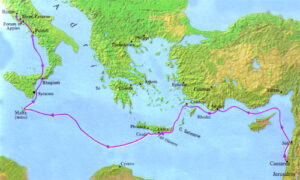
Who made this voyage? Paul? Josephus? Apollonius?
“Walking orderly”
Twice the Holy Spirit “forbids” Paul to go to Jerusalem (Acts 21.4, 21.11) but the apostle, bumptious egotist that he is, will have none of it. Paul is “ready to die” for Jesus. In Jerusalem, Paul is received “gladly” by the brethren, even though they have heard that he has forsaken Moses (Acts 21.21). To prove his kosher credentials they require him to perform a purification ceremony of four selected men in the temple, thus proving to the wary Jews that he still “walks orderly and keeps the law” (Acts 21.24).
The gesture goes badly wrong. Paul’s presence in the temple “stirs up all the people”. For some reason, the hostile Jews believe that Paul has profaned the temple by taking in his Greek helpmate Trophimus. (Nasty!) The temple doors are shut, the “whole city is in uproar” (the Christian heroes do love to be the centre of attention). At this point, the Romans “run down” and rescue Paul from a beating (Acts 21.32), the commander thinking Paul might be “the Egyptian” rabble rouser (a character otherwise found in the pages of Josephus! – Wars, 13).
Bizarrely (surely this is theatre?), the Romans allow the apostle to address “the people”, giving Paul an opportunity to rehearse his “rabbinic policeman turned apostle in Damascus” routine. He finishes by telling his audience that, anyway, in a trance the Lord had warned him that the Jews would not listen and that he should get himself off to the Gentiles.
The Jews – en masse, it seems – demand his execution. The nonplussed Romans think it a good idea to scourge Paul, the better to get at the truth. But this does not happen. At this point, the apostle brings a rabbit out of a hat: having previously stressed his Jewish credentials, he now declares himself a Roman, “free born” (Acts 22.28).
The uncertain Romans decide to place Paul before the Jewish chief priests and council, with the result that Paul is struck on the mouth but manages to cause “great dissension” between the Sadducees and Pharisees on the council by claiming to be a Pharisee and declaring his belief in resurrection. That is all it takes for the scribes to “find no evil in this man”. Even so, in the supposed melee, Paul has to be taken into protective custody by the Romans, “lest he be pulled in pieces” by incensed Jews.
Chatting with Romans
It seems Paul was not safe from Jewish malice even within the walls of the Antonia fortress. In a turn of events surely more appropriate to pantomime, a fraternity of fanatics “bound under a great curse” not to eat until they had killed the apostle, were so lax about security that Paul’s own nephew was able to learn of the plan and then tip off his incarcerated uncle!
The guard commander is informed yet rather than consulting with the chief priests or strengthening the guard, he decides instead to assemble the better part of the garrison to escort his problematic guest to Caesarea and into the custody of the provincial governor Felix. The commander writes a letter to Felix (rather curiously, reproduced in Acts itself! – 23.26,30) in which he says that Paul has done “nothing worthy of death or of bonds” (Acts 23.29).
Paul is held by Felix until a posse of senior priests arrive to present their case through the skills of an orator, Tertullus. The charges against Paul are “sedition among Jews throughout the world”, being the ringleader of a sect called the Nazarenes, and profaning the temple. Paul’s response is that they “can’t prove a thing” (Acts 24.13) and that he was merely bringing “alms and offerings”. Paul cleverly avoids clarifying to whom he was bringing the largesse, the temple or the Christian elders? No wonder Felix hopes for a bribe! (Acts 24.26).
Felix remains undecided about Paul but indulges his wife Drusilla’s interest in the apostle. (One wonders if they talked about old times, when Paul blinded the magician Atomos – the very sorcerer who secured Felix his bride!) Paul, for all his “innocence”, begins a two-year term of imprisonment which ends only when Felix is replaced by Festus.
The new procurator immediately takes up the cause célèbre. Why, one wonders?
It’s hard to credit that an incarcerated Jewish radical was the most pressing item on a new governor’s agenda. The claim is, of course, merely Christian self-aggrandizement.
In the real world, as recorded by Josephus, Festus inherited a country beset by turmoil and in which the procurator was executing “imposters” on a daily basis. Caesarea was a hotspot not because of “Paul” but because of strife between the Greek and Jewish communities which had cost the Jews their civic rights in the year 60. In Jerusalem, the people were being terrorised by the Sicarii, religiously-motivated bandits.
A word with Nero?
In a bizarrely unlikely event, the imprisoned apostle refuses to “do the Jews a pleasure” and attend a procurator’s trial in Jerusalem (Acts 25.9). But in any case, Festus has already summoned the High Priest and his men to Caesarea for a new trial of Paul.
At this point, Paul makes his famous “appeal to Caesar” (Acts 25.11). This happened to be the notorious emperor Nero, who in the year 59 ordered the murder of his mother Agrippina and his aunt Domitia. The Christian apostle prefers the justice of the effete Roman tyrant to his chances with the governor’s court in Jerusalem!
What is so ridiculous here is that Paul is lodging an appeal before his case has even been heard!
And why need there be a transfer anywhere? The accused, the prosecution and the judge are assembled in Caesarea – and the judge has already decided “they brought none accusations of such things as I supposed … I have no certain thing to write unto my lord … it seemeth to me unreasonable to send a prisoner, and not withal to signify the crimes laid against him.” (Acts 25.18,27). Festus needs a second opinion and the Jewish king, Agrippa II, and his sister Bernice happen to be in town. Their presence affords Paul another opportunity for his “rabbinic policeman turned apostle in Damascus” routine (it’s such a star performance Agrippa is “almost persuaded to be a Christian – Acts 26.28) The king agrees that Paul deserves “neither death nor bonds.”
In what is then the most ridiculous abuse of Roman judicial process, words placed into the mouth of king Agrippa declare: “This man might have been set at liberty, if he had not appealed unto Caesar.” (Acts 26.32) We are asked to believe that because Paul has uttered the magic words “I appeal unto Caesar” that a process is in train that neither provincial governor nor king can stop – and even though there is no discernible crime to report!
Yet only a few years earlier, the procurator Felix had assassinated the high priest Jonathan with impunity and his successor Festus was no man of delicate disposition either, as Josephus records:
“So Festus sent forces, both horsemen and footmen, to fall upon those that had been seduced by a certain impostor, who promised them deliverance and freedom from the miseries they were under, if they would but follow him as far as the wilderness. Accordingly, those forces that were sent destroyed both him that had deluded them, and those that were his followers also.“
– Josephus, Antiquities, 20.10.
As it happens, there WAS an appeal made to Nero at this time – by the Jewish High Priest Ismael, insisting that a high wall recently built to shield the temple from the gaze of Agrippa’s palace not be torn down. Nero, acceding to his wife Poppaea’s influence (a “God-fearing” Jewish sympathizer) agreed, though Ismael was kept as a hostage in Rome.
Perhaps with fellow captive Ismael, “Paul” spent many a happy hour on the banks of the Tiber, mulling over old times and discussing the finer points of Mosaic law?
Where DID they get their ideas from?
As it happens, when Tacitus narrates the high dramas of emperor Nero’s reign, he also mentions, in passing, appeals to Caesar and the Senate:
” Nero … also raised the dignity of the Senate, by deciding that all who appealed from private judges to its house, were to incur the same pecuniary risk as those who referred their cause to the emperor. Hitherto such an appeal had been perfectly open, and free from penalty.”
– Tacitus, Annals, book XIV
And on to Rome?
As it happens, the transportation of the apostle to the imperial city – complete with shipwreck and snake miracle – is NOT an event confirmed by Paul’s own letters.
The so-called “prison letters” – Philippians, Philemon, Colossians and Ephesians – though traditionally ascribed to Paul in his Roman captivity – actually say nothing beyond the words “prisoner in Jesus Christ” and “bonds” to endorse that claim. Yet, the Pauline lexicon is redolent with words of servitude, suffering and “imprisonment”, all of which relate to his service to Christ, not to a literal state of affairs. “Rome” is nowhere mentioned in any of the prison letters. A whole edifice of fraud rests on the single reference to “Caesar’s household” of Philippians 4.22, and a curious use of “palace” in Philippians 1.13:
“My bonds in Christ are manifest in all the palace, and in all other places.”
We might reasonably suppose that a “victim of Nero’s persecution” might have recorded some comment on the Great Fire of Rome which provoked the official hostility, some comment on the “witchhunt of the Christians” which supposedly followed the disaster, some comment on the lurid treatment later scribblers say was meted out to his fellow Christians, some pithy words of consolation for martyrs that surely had so recently gone before him. But no, not a word.
Our heroic Paul is preoccupied with himself and his own fate. He finds time to brag of his Hebrew ancestry (Philippians 3.5) – at a time like this? He actually anticipates “coming to see” the Philippians (1.27; 2.24); he speaks of sending Timotheus (“fellow servant of Jesus Christ”) and confirms that he has reluctantly “supposed it necessary” to release his other skivvy, Epaphroditus, who made himself very ill servicing Paul’s needs!:
“Because for the work of Christ he was nigh unto death, not regarding his life, to supply your lack of service toward me.” – Philippians 2.30.
Damning the missive as late and fake is the opening salutation to the “bishops and deacons” (Philippians 1.1), an anachronism later corrected with a whole raft of less embarassing alternatives (overseers, presbyters, elders, etc.). Yet the Greek is clear: episkopoi and diakonoi.
In the brief 25 verses of Philemon, Paul, “a prisoner of Jesus Christ” (NOT of Caesar Nero!) writes to “fellow labourer” Philemon and “fellow soldier” Archippus. Should we suppose the apostle is also literally a labourer and a soldier?! Yet by verse 9, Philemon has also become a “prisoner of Christ” and Paul tells his “fellow prisoner” to put any debts of runaway slave Onesimus “on his own account”! Paul then gives instructions for a lodging to be prepared for his own use – quite an extraordinary request for a prisoner facing martyrdom! Colossians similarly is ludicrous understood as a “prison letter”. Again, the apostle speaks of sending one of his sidekicks – this time it’s Tychicus – to learn of affairs at Colosse. Another of the brothers, Aristarchus, is called both “fellow prisoner” (4.10) and “fellow worker” (4.11). The only reference to the writer’s location is verse 4.9.
“They shall make known unto you all things which are done here.“
But where is here? Paul, it seems, has learned of a church not of his own foundation. He is anxious to impose his own theology and attacks “errors”, almost the entire content of the letter. Verse 4.9 refers to “correct practice” in Christ’s ministry – and certainly not to how things are run in a Roman prison!
But not only is the where in doubt but also the when. Detering draws our attention to the Elchasai of the 2nd century whose “errors” are precisely those attacked by a “first century Paul”:
“So far, the exegetes’ attempts at identifying the heretics in the Epistle to the Colossians have failed because they started from the unprovable assumption, that the letter had originated in the second half of the 1st century. A better approach would take as its starting-point the parallels found in 2nd century history of religion, and proceed from there in order to finally come to a dating of that letter. A great many parallels between the Colossian heresy and the Jewish-Christian sect of Elchasai that came up in 2nd century CE clearly show that those groups are identical and therefore it’s one and the same faction we have to deal with here. Not only is the synthesis of circumcision and στοιχεῖα (the elementals) worship, of which there isn’t any analogy elsewhere in the history of religion, a feature of both heresies; one can moreover demonstrate it to be probable that Col. 2:18 presupposes knowledge of the Book of Elchasai.“
– Dr. Hermann Detering, translated by Frans-Joris Fabri
The final “prison letter”, Ephesians, is the least convincing. It is a veritable comedy of errors. Paul, we are led to believe by Acts, spent at least three years with the brethren in Ephesus. Yet Ephesians is the most impersonal of letters, devoid of any human touch or individual greeting. The writer has the “detachment” found in Colossians: “After I heard of your faith …I cease not to give thanks for you, making mention of you in my prayers” (1.15,16). Indeed, whole chunks of Ephesians are copied from Colossians, leading scholars to speculate Ephesians is a pastiche of earlier letters and is not really the work of Paul at all. But then, are any of the letters the work of Paul? Other scholars suggest Ephesians is a re-labelled letter to the Laodiceans, that perhaps it was sent from Caesarea, or even from Ephesus itself. Whatever else, Ephesians gives NO support to the notion that Paul was ever in Rome.
Indeed, the “Epistle to the Romans” gives the game away. Supposedly Romans was written in Corinth about the year 60 by a Paul who was anticipating his first visit to Rome, not a prisoner in chains. In chapter 16, the apostle greets by name and personal salutation some 27 individuals in the city he has never visited! The one person we might expect him to address, St Peter, first “Bishop of Rome”, is NOT among them! What has been changed is not the salutations but the address: Romans makes better sense understood as originally an epistle to the Corinthians, warning the brethren of “greedy men deceiving the simple minded”.
Now who could they be, one wonders?
Raskin observes, Paul’s commendation of an assistant (16.1): “Phebe our sister, a servant of the church at Cenchrea” (a port near Corinth) makes no sense to the church at Rome and perfect sense to the church at Corinth (Raskin, p468).
Source?
As for Rome, we do have a clue to the source of the “Pauline voyage”: our old friend and cornucopia of the Christian fraudsters, Josephus. And if we need a template for “martyrdom in Rome” in the mid-60s we need look no further than the betrayed conspiracy to assassinate Nero in the year 65 of Gaius Calpurnius Piso. The “martyrs” to liberty on that occasion included the philosopher Seneca, the poet Lucan and
“… line after line of chained men dragged to their destination at the gates of Nero’s Gardens … Executions now abounded in the city.” (Tacitus Annals 15).
Is this reference to condemned men at Nero’s garden gate the seed for the bogus tale now found in Tacitus book 15 of “torched Christian martyrs“?
When Nero botched his own suicide a few years later, his former slave completed the job. The freedman’s name is shared by Paul’s supposed playmate from Philippi – Epaphroditus.
Where DID they get their ideas from?
How many ships, bound for Rome, and carrying a cargo of priestly Jewish prisoners for trial before Caesar, are likely to have been shipwrecked about the year 63 AD – and to have left an historical record? Josephus was on one such ship. He swam all night, finally being saved by another ship and taken to Puteoli.
Josephus: Shipwrecked on voyage to Rome
“But when I was in the twenty-sixth year of my age, it happened that I took a voyage to Rome … At the time when Felix was procurator of Judea there were certain priests of my acquaintance … whom on a small and trifling occasion he had put into bonds, and sent to Rome to plead their cause before Caesar …
Accordingly I came to Rome, though it were through a great number of hazards by sea; for as our ship was drowned in the Adriatic Sea, we that were in it, being about six hundred in number, swam for our lives all the night; when, upon the first appearance of the day, and upon our sight of a ship of Cyrene, I and some others, eighty in all, by God’s providence, prevented the rest, and were taken up into the other ship.
And when I had thus escaped, and was come to Dicearchia, which the Italians call Puteoli.“
– Josephus, Life,3
St Paul: “Shipwrecked on voyage to Rome”
“Felix, willing to show the Jews a pleasure, left Paul bound.” – Acts 24.27.
“They talked between themselves, saying, This man doeth nothing worthy of death or of bonds. – Acts 26.31.“It was determined that we should sail into Italy … And entering into a ship of Adramyttium … we came to Myra … And there the centurion found a ship of Alexandria sailing into Italy … they sailed close by Crete. But not long after there arose against it a tempestuous wind … no small tempest lay on us … But when the fourteenth night was come, as we were driven up and down in Adria … And falling into a place where two seas met, they ran the ship aground; and the forepart stuck fast, and remained unmovable, but the hinder part was broken with the violence of the waves.
The centurion … commanded that they which could swim should cast themselves first into the sea, and get to land. And the rest, some on boards, and some on broken pieces of the ship. And so it came to pass, that they escaped all safe to land. And after three months we departed in a ship of Alexandria …
And landing at Syracuse … and came to Rhegium: and after one day the south wind blew, and we came the next day to Puteoli.“
– Acts 27,28
Sources:
Hermann Detering, The Falsified Paul, Early Christianity in the Twilight (Journal of Higher Criticism, 2003)
A. N. Wilson, Paul, The Mind of the Apostle (Sinclair-Stevenson, 1997)
John Ziesler, Pauline Christianity (Oxford, 1990)
Edward Stourton, In the Footsteps of Saint Paul (Hodder & Stoughton, 2004)
J. Murphy-O’Connor, Paul, A Critical Life (Clarendon, 1996)
J. Murphy-O’Connor, Paul, His Story (Oxford, 2005)
Daniel T. Unterbrink, Judas the Galilean (iUniverse, 2004)
Jay Raskin, The Evolution of Christs and Christianities (Xlibris, 2006)
- A Jew called Saul? An apostle called Paul? A witness to Jesus? Or plain invention?
Up Close and Personal - A journey to Cyprus? A mission to Galatia?
Mission Impossible - Big city tour? Athens, Corinth, Ephesus?
Magical Mystery Tours – A Greek Odyssey - Voyage to Rome? A martyr’s death? “Tradition” versus truth.
Magical Mystery Tours – The Road to Rome - Epistles? Letters home? Papering over the cracks.
From our own Correspondent
St Paul loses his head

Eusebius, propagandist for Constantine in the 4th century, was among the first to record that the dastardly Nero had the apostles Peter and Paul killed.
“It is, therefore, recorded that Paul was beheaded in Rome itself, and that Peter likewise was crucified under Nero. This account of Peter and Paul is substantiated by the fact that their names are preserved in the cemeteries of that place even to the present day.”
– History of the Church,2.25.5.
In an often used sequence of fraud, a “tradition” of martyrdom – and how else could a Christian saint die? – was followed by a memorial tomb. With the “evidence” of a tomb, a lurid tale of heroic death soon followed. Thus, another profitable shrine entered the Christian landscape.
It gets better. According to medieval legend, where Paul’s decapitated head bounced upon the ground three fountains sprang from the earth.
Handy – in a Rome that, with the triumph of Christ, had lost its ancient water supply!
A procurator in the real world

“Now as for the affairs of the Jews, they grew worse and worse continually, for the country was again filled with robbers and impostors, who deluded the multitude.
Yet did Felix catch and put to death many of those impostors every day, together with the robbers.
He also caught Eleazar, the son of Dineas, who had gotten together a company of robbers; and this he did by treachery; for he gave him assurance that he should suffer no harm, and thereby persuaded him to come to him; but when he came, he bound him, and sent him to Rome.”
– Josephus, Antiquities, 20.5
“As to the number of the robbers whom [Felix] caused to be crucified, and of those who were caught among them, and whom he brought to punishment, they were a multitude not to be enumerated.”
– Josephus, Wars, 2.13.2.
Paul saved by Roman troops
(NOT angels, earthquake, or other miracles)

When Paul returned to Jerusalem after his missionary blitz in Asia Minor, he was imprisoned by the Roman guard because of the unmitigated hostility of those dastardly Jews.
But those Jews just would not rest. Even while he was in detention, more than 40 oath-taking Jews swore to kill Paul. This time no fewer than 470 Roman troops arrived to escort him safely to Caesarea! (Acts 23.12,23.)
All good Christian stuff.
Curious, or just fiction?
“It is curious, however, that a grown-up nephew with Roman citizenship should appear at just the moment when it was necessary to have immediate access to, and forceful influence on, the senior Roman official in Jerusalem.”
– Murphy O’Connor, Paul, A Critical Life, p45.
Changing ships?
Supposedly, Paul changed ships at Myra on his way to Rome.
“When we had sailed over the sea of Cilicia and Pamphylia, we came to Myra, a city of Lycia. And it was there that the centurion found a ship out of Alexandria that was sailing to Italy and upon this vessel he placed Paul and the other prisoners.“
– Acts 27:5-6.
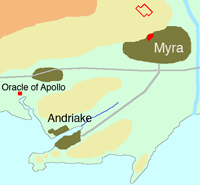
The account in Acts makes no mention of Andriake, the actual port of Myra,
Myra was in fact 3 miles inland.

Andriake. In the summer of 2009 archaeologists identified a small synagogue amongst the ruined warehouses dating from the 3rd century AD.
The harbour itself silted up in late antiquity.
2nd century Elchasai in focus
“Let no one disqualify you, insisting on asceticism and worship of angels, going on in detail about visions, puffed up without reason by his sensuous mind.”
– Colossians 2.18.
The Elchasai rejected the writings of Paul, practiced circumcision, asceticism and astrology, and claimed that their own holy book was given them by a colossal angel.
All at sea

A Jew and yet a Roman citizen. Educated in Jerusalem. A Pharisee and a prolific letter writer. Shipwrecked on voyage to Rome.
“Paul” – or Josephus?
Paul in Rome?
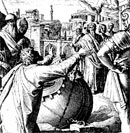
According to a “tradition” invented in the 2nd century, Paul was tried before the emperor Nero and then released.
He then made another missionary journey, this time to Spain (and Crete). The apostle was re-arrested, returned to Rome, imprisoned a second time and then executed by Nero after the great fire!
This ridiculous itinerary makes it possible for the “pastoral” epistles to be “authentic”: 1 Timothy, 2 Timothy, Titus.
St Paul survives venomous snake bite?
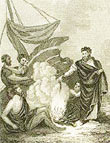
The ship carrying Paul to Rome encountered two weeks of storms, but the apostle was unconcerned. An angel had assured him that he “must” appear before Caesar (Acts 27.24). The insouciant rabbi urged his terrified shipmates to eat and be of “good cheer.”
Paul (and all 275 others on board) survived shipwreck on Melita (Malta) but the apostle himself was bitten by a viper in the firewood. The watching locals decided Paul “must be a murderer” (Acts 28.4). But when the apostle showed no ill-effects, the impressionable natives decided he “was a god” (Acts 28.6).
Either way, naturalists say there are NO venomous snakes on Malta – and there never were.
According to the yarn, after a three-month stay on the island, Paul kept his date with destiny by taking another ship bound for Puteoli (near Naples).
Paul: Unknown End
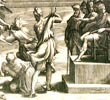
By the time of Pope Zephyrinus (198 -217), Paul had acquired a tomb on the Via Ostensis.
In the 4th century, Eusebius of Caesarea recorded the news that Paul had in fact been beheaded by Nero.
Choose at any convenient date between 64 and 67 for this “martyrdom.”
